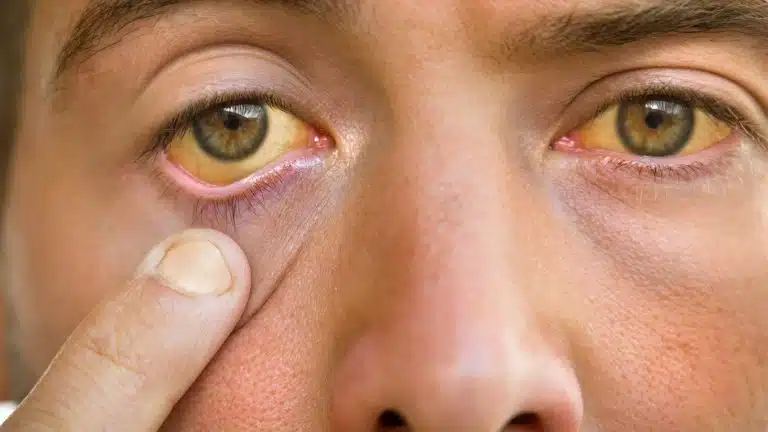Alcoholic Jaundice & 6 Other Symptoms Of Alcoholic Liver Failure

Liver damage can occur in those who drink alcohol, especially if you’re engaging in binge drinking or heavy drinking. Alcohol-related liver disease (ARLD) is caused by excess alcohol intake.
Those with ARLD may experience a wide range of symptoms, some of which are life-threatening. However, if caught in the early stages, those with ARLD can abstain from alcohol to highly reduce their symptoms.
High alcohol consumption can lead to liver disease or liver failure. Here are some of the symptoms you may experience.
1. Alcoholic Cirrhosis
Known as the final step in alcoholic liver disease (ALD), cirrhosis occurs after the liver has suffered from inflammation and a high amount of toxins. Cirrhosis is scarring of the liver which is permanent.
Abstaining from alcohol is crucial for those with ALD. Once the liver develops fibrosis and cirrhosis, the liver has incurred scar tissue that can damage the function of the liver.
When this happens, one may experience swelling of the abdomen due to a buildup of fluid known as ascites. Abdominal pain may be severe. In serious cases of liver cirrhosis, a person may need to have a liver transplant.
2. Alcoholic Jaundice

Jaundice is another symptom of liver disease that can be caused by drinking alcohol. Jaundice, or when your skin and eyes turn yellow, is one of the most noticeable symptoms.
This yellowing of the skin is a good indication that your liver may have difficulty operating normally. Immediately limit the amount of alcohol you drink, or stop completely if you notice any symptoms of jaundice.
3. Alcoholic Fatty Liver Disease
Alcoholic fatty liver disease can be reversible if caught early. This type of liver disease occurs when there becomes a build-up of fat in the liver known as steatosis.
During this process, liver function is impaired due to swelling. Those with steatosis may develop steatohepatitis which means the liver also has inflammation.
When your liver becomes damaged, hepatic encephalopathy may occur. When this happens, your liver stops functioning properly and you can develop toxins in your blood.
Once toxins are present in your blood, you have a higher risk of a weakened immune system, brain damage, and mental confusion.
4. Liver Cancer
Heavy alcohol drinkers have a high risk of developing liver cancer. Alcohol can cause a number of cancers in the esophagus and digestive tract.
Those with cirrhosis of the liver are more likely to develop liver cancer than the general population. Due to the lack of liver function, food digestion and the removal of toxins from your body may be interrupted.
Cancer can be in any location in the liver. If left untreated, liver cancer can spread to other organs of the body.
5. Hepatitis B & Hepatitis C
Alcoholic hepatitis is a severe liver injury that causes inflammation. Hepatitis is usually seen in patients with cirrhosis.
Alcohol abuse can worsen viral infections and weaken the immune system. Those with hepatitis may become malnourished as well.
6. Weight Loss
Weight loss can be a symptom of alcoholic hepatitis. You may develop loss of appetite and nausea from the liver dysfunction you’re experiencing.
Because of the damage to your liver, it’s likely you have a weakened immune system. Because of this and the loss of appetite, malnutrition may occur.
Furthermore, a lack of nutrients can cause liver cell damage. If you are diagnosed with liver disease, remember to monitor your food and drink intake.
7. Kidney Failure
Once heavy drinking has caused liver damage, the liver may struggle with its ability to handle blood flow and toxins. When this happens, you can experience kidney failure.
Heavy drinkers can develop both cirrhosis and kidney failure. Due to internal bleeding and body fluid accumulation in the abdomen, your kidneys can become infected and eventually fail.
What To Do If You Have Symptoms
If you notice early signs of liver problems, contact your doctor immediately. Knowing the early symptoms and taking action may reduce your chances of damaging effects.
If you’re experiencing any of these symptoms, be sure to see a doctor right away. Your doctor may perform liver function tests. They might also want to perform a liver biopsy to get a closer look at your liver tissue to determine the health status of your liver.
In addition to this, your doctor can perform a number of blood tests to determine your liver status and find out the number of enzymes you have. If necessary, you may require liver transplantation.
If you’re struggling with alcohol abuse, contact our helpline to speak with one of our healthcare specialists today.
Written by Ark Behavioral Health Editorial Team
©2024 Ark National Holdings, LLC. | All Rights Reserved.
This page does not provide medical advice.
Alcohol Research - Alcoholic Liver Disease: Pathogenesis and Current Management
Frontiers in Physiology - Acute Alcohol-Induced Liver Injury
National Health Service (NHS) - Alcohol-Related Liver Disease
National Health Service (NHS) - What is Liver Cancer?
National Institute on Alcohol Abuse and Alcoholism (NIAAA) - The Epidemiology of Alcoholic Liver Disease
National Library of Medicine - Alcoholic liver disease: A current molecular and clinical perspective
World Journal of Hepatology - Alcoholic Liver Disease


Questions About Treatment?
Ark Behavioral Health offers 100% confidential substance abuse assessment and treatment placement tailored to your individual needs. Achieve long-term recovery.
100% confidential. We respect your privacy.
Prefer Texting?
Our friendly support team is here to chat 24/7. Opt out any time.







 Learn More
Learn More








